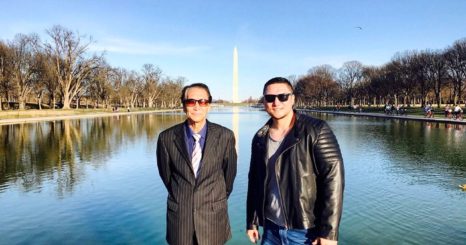Bahram Sintash, who was born in Xinjiang, China, lives in the United States. Since January, he has been building Uyghurism.com to preserve digital copies of the popular Uighur journal Xinjiang Civilization.
After my father, Qurban Mamut, was taken by Chinese authorities to an indoctrination camp about a year ago, I remember thinking with deep sadness of his words to me as a child: “You were born during a very good time.”
My father, a prominent Uighur intellectual and the former editor in chief of the Communist Party-controlled Uighur journal Xinjiang Civilization, was comparing his youth during the Cultural Revolution to mine. I was born in 1982, just days after China’s constitution was modified in part to clarify citizens’ fundamental rights and reflect Deng Xiaoping’s determination to lay a lasting foundation for domestic stability and modernization. As a result, I grew up during a Uighur cultural renaissance that included an outpouring of Uighur novels, history books, journals, art, music, films and TV shows. Students studied the Uighur language in school from kindergarten to college.
“You are from a lucky generation. I hope what happened to us never happens again,” my father had said as he showed me the scars on his back from the torture he had endured for supporting the Chinese revolutionary Liu Shaoqi. The Red Guards captured my father in 1967. During his captivity, they hung him by his wrists and whipped him.
My father’s dream of a crackdown never happening again was short-lived. In 1996, China launched the first of a series of “strike hard” campaigns to ostensibly fight “splittism and illegal religious activities.” Heavy police presence became a constant in Xinjiang, where most Uighurs live. After the 9/11 attacks, the term “terrorism” was increasingly used to justify Xinjiang’s heavy police presence. By 2017, the government had effectively banned the Uighur language from classrooms. The government’s religious restrictions are now so stringent that it has effectively outlawed the practice of Islam.
Over the past few years, China has also detained more than 1 million Uighurs in modern-day concentration camps. My father, along with nearly all of the Uighur intellectuals who helped shape my generation’s love and knowledge of the Uighur culture, are the latest victims.
My father had always trodden carefully, knowing what words and sentences were off limits, as the government could deem them as hinting at Uighur independence or separatism. While editor-in-chief of Xinjiang Civilization, he sought to educate Uighurs about our history and to keep our rich culture alive for the next generation. This was a Communist Party-run publication, meaning the government signed off on everything. And yet, my father was still arrested for his connection to the journal, accused of spreading an ideology the government did not approve of.
China is even purging Uighur intellectuals who were state-hired and in their posts for as long as three to four decades, accusing them of being “two-faced” and promoting separatism. In the last couple years, the former director of the Xinjiang Education Supervision Bureau, the former president of Xinjiang University and many Uighur professors and scholars have been detained under such accusations. In September, Radio Free Asia reported that Halmurat Ghopur, the former president of Xinjiang Medical University Hospital, was sentenced to death with a two-year reprieve.
It’s clear that China’s objective is to kill our identity. But if we can save our culture, China cannot win. In response to Beijing’s crackdown, a growing network of Uighurs are working to preserve our culture for future generations. Uighur book sellers have been shipping large quantities of books overseas, as well as opening bookstores and starting new publications in Turkey. Publishers outside China are reissuing many old and out-of-print Uighur books, as well as publishing new books from Uighur authors overseas.
On the online sphere, Uighurs living overseas are building open-source websites that feature digitized Uighur books and journals. I am also aware of some tech-savvy Uighurs who plan to compile video archives and republish blogs that China’s government has taken down or banned. For the last couple months, I have been building a website called Uyghurism.com to launch digital copies of Xinjiang Civilization — it is the least I can do for my father, about whom I have heard no news since he was detained.
Beijing believes China can only reach its full potential if the cultural and ethnic identities of its minorities dissolve away. It believes that the modifications to its constitution in 1982, which paved the way for a Uighur cultural renaissance, were a mistake. But we Uighurs will prevail as a culture if we find a way to save our language and our art. Our message is clear: We are not erasable.
This column was produced in collaboration with The WorldPost, a publication of the Berggruen Institute.
Read more:
The Post’s View: China is brainwashing more than a million Uighurs. The world must demand justice.
Rushan Abbas: My aunt and sister in China have vanished. Are they being punished for my activism?




